PRINCETON, NJ -- Married couples in America today maintain a strong and traditional division of labor, with 68% of married adults saying the wife does the laundry, and 57% saying the husband does the yard work.
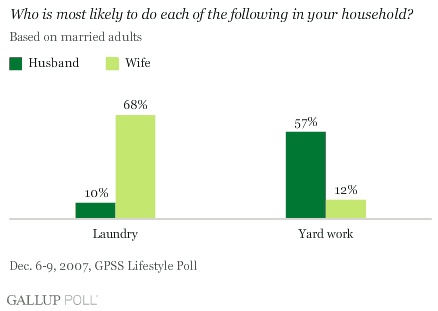
║┌┴¤═°'s annual Social Series Lifestyle poll, conducted in December 2007, reveals that women continue to be much more likely than their husbands to perform a wide number of household duties, with men being reported as primarily responsible for only two. The survey asked all married respondents to indicate whether they or their spouse was "most likely" to do each of 10 chores, with those who said they had a child under the age of 18 also asked about child care.
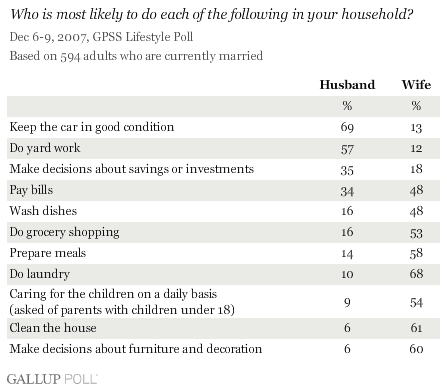
Over half of married respondents say the wife is most likely to do six household chores: laundry, cleaning the house, making decisions about furniture and decoration, preparing meals, caring for the children (for couples with children under 18), and doing the grocery shopping. Respondents are also significantly more likely to say the wife, rather than the husband, washes dishes and pays the household bills.
On the other hand, over half of married couples say the husband keeps the car in good condition and does yard work.
There is a little more equal distribution of labor on the one remaining chore included in the list -- investments. Although 35% of married respondents say the husband makes decisions about savings and investments, compared to 18% saying the wife does this, almost half of respondents in the poll say these are shared equally.
Husbands and Wives Report Division of Labor Differently
These reports on who does what within the household are highly colored by the gender of the married partner who is doing the reporting. In other words, married men report what goes on in their household differently than married women.
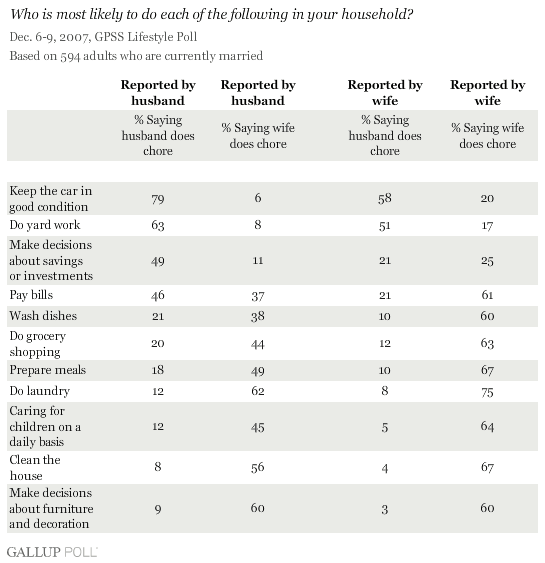
Generally, husbands are more likely than wives to say they are responsible for a given chore, and vice versa. Husbands and wives often appear to perceive who does what in the household differently.
The differences in some instances are substantial.
- One of the biggest discrepancies comes in reports of who pays the household bills. Men are more likely to report that they -- the husbands -- pay the bills, while women are strongly likely to claim that they -- the wives -- pay the bills.
- Six out of 10 women report that they are more likely to wash the dishes, while men are more likely than women to say the dishes are done equally.
- Two-thirds of women say they are more likely to prepare meals. A much smaller percentage of husbands say their wives prepare the meals.
- Although women are more likely to say their husbands, rather than they themselves, keep the cars in good condition and do yard work, the percentages are much lower than those reported by husbands, who overwhelmingly say they are responsible for these chores.
- Half of men say they are responsible for investments and savings, and only 11% of men say their wives are responsible. Women, however, are much more likely to say there is equal responsibility.
Trends Over Time
Married Americans were asked about this same list of chores (with the exception of child care) in a 1996 ║┌┴¤═° Poll. For the most part, there has been only slight change in the distribution of household labor over the last 11 years.
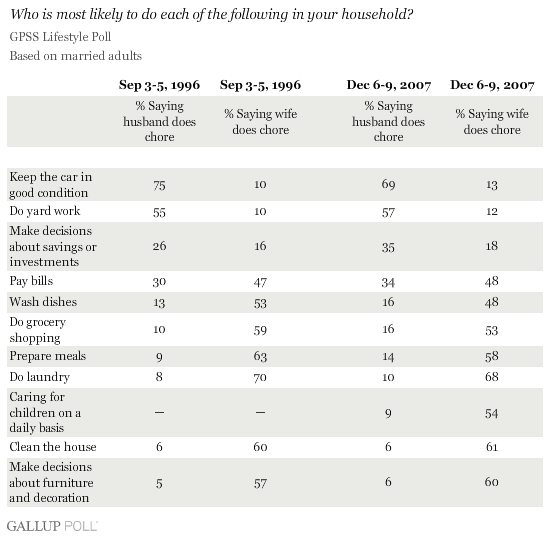
Married adults are slightly more likely now than in 1996 to report that husbands are primarily responsible for a number of the items on the list, but in all instances, these changes are small.
Few Age Differences
Differences might be expected in these patterns of household labor distribution by age: younger married couples might be thought more likely to share chores equally or to establish responsibilities for the husband that have traditionally been more of the wife's domain.
But that does not appear to be the case. Husbands and wives over 50 report a distribution of these chores that differs little from that of husbands and wives under 50.
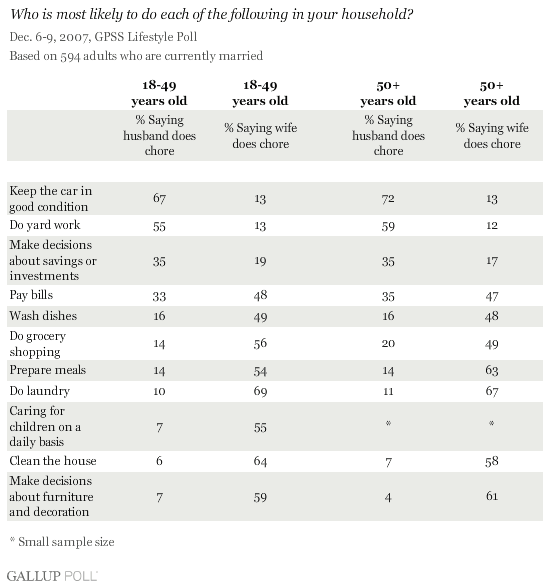
Implications
There continues to be a significant division of labor by gender within American married households. Women appear to be more likely than men to do a number of chores within the home. There has been little change in this pattern compared to ║┌┴¤═°'s previous survey in 1996.
Whether this state of affairs is good or bad, of course, is highly dependent on one's perspective. A division of labor in any social unit is often the most effective way to achieve goals and maintain orderly daily progress. Throughout history, certain household jobs have traditionally been considered more within the wife's domain, and others (fewer in number) within the husband's domain. That pattern appears to persist, even in an era in which wives are more likely to work outside the home than was the case in the past, and in which there has been much more of a focus on equality between the sexes.
The poll did not ask married respondents whether they thought the division of responsibility as reported was a positive or a negative. Such questioning might be of value in future surveys.
And there is the interesting dimension of the reporting party within each marriage. Husbands and wives view the household domain differently. The survey did not include a mechanism by which each married partner could be interviewed separately. But the analysis suggests that partners are generally more likely than their spouses to believe they are responsible for a given chore.
Survey Methods
Results are based on telephone interviews with 1,027 national adults, aged 18 and older, conducted Dec. 6-9, 2007. For results based on the total sample of national adults, one can say with 95% confidence that the maximum margin of sampling error is ┬▒3 percentage points.
For results based on the sample of 594 adults who are currently married, the maximum margin of sampling error is ┬▒4 percentage points.
In addition to sampling error, question wording and practical difficulties in conducting surveys can introduce error or bias into the findings of public opinion polls.
